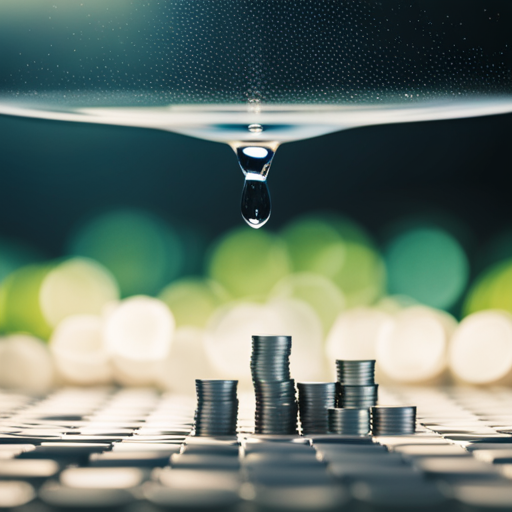Are you tired of dealing with hard water and the costly repairs that come with it? Look no further than salt pellets for your water softener. With various types of salt pellets available, it can be overwhelming to determine which one is right for you.
But don’t worry, we’ve got you covered with everything you need to know about salt pellets for water softeners. In this article, you’ll learn about the different types of salt pellets available, the benefits of using a water softener, and how to properly maintain and care for your water softener to ensure optimal performance.
Say goodbye to hard water and hello to a soft wallet with the right salt pellets and maintenance routine for your water softener.
Key Takeaways
– There are three main types of salt pellets for water softeners: solar salt, evaporated salt, and rock salt.
– Potassium chloride is an eco-friendly and health-conscious alternative to sodium chloride.
– Regularly checking the salt level in your water softener is important for best results.
– Water softeners are a great long-term solution for hard water problems.
Types of Salt Pellets
You may be wondering what the three main types of salt pellets for water softeners are: solar salt, evaporated salt, and rock salt.
Solar salt is the most popular and natural type of salt pellet for water softeners. It’s made by evaporating seawater in salt ponds, leaving behind salt crystals that are then harvested and packaged. Solar salt is relatively inexpensive and has a low environmental impact. However, it may contain impurities that can leave residue in your brine tank and pipes.
Evaporated salt is the purest type of salt pellet for water softeners, but it’s also the most expensive. It’s made by boiling brine in vacuum chambers until it crystallizes, then drying and screening the crystals to remove any impurities. Evaporated salt is highly soluble and doesn’t leave as much residue as other types of salt pellets. However, its high cost may not make it a practical choice for some households.
Rock salt is the least expensive type of salt pellet for water softeners, but it’s also the least pure. It’s mined from underground salt deposits and may contain rocks, dirt, and other impurities. Rock salt is a good option for households on a budget, but it can leave a lot of residue in your brine tank and pipes.
Cost comparison and environmental impact are important factors to consider when choosing the right type of salt pellet for your water softener.
Benefits of Water Softeners
Take advantage of the benefits of using a water softener, such as reducing mineral buildup in appliances and plumbing fixtures. When hard water is used in appliances and fixtures, minerals can accumulate over time and cause damage. This can lead to costly repairs or even the need for replacement. By using a water softener, you can prevent mineral buildup and extend the life of your appliances and plumbing fixtures. Not only does this save you money in the long run, but it also helps to improve the overall quality of your water.
In addition to cost savings, using a water softener can also improve water quality. Hard water can leave behind a residue on dishes, clothes, and even on your skin. This residue can be difficult to remove and can cause irritation to sensitive skin. By softening your water, you can eliminate this residue and enjoy cleaner, softer water. This can lead to improved skin and hair health, as well as a better overall cleaning experience. So, take advantage of the many benefits of using a water softener and enjoy improved water quality and cost savings.
| Benefits of Water Softeners | |||
|---|---|---|---|
| Reduces mineral buildup in appliances and plumbing fixtures | Saves money in the long run | ||
| Improves overall water quality | Eliminates residue on dishes, clothes, and skin | Reduces soap scum and makes cleaning easier | Helps extend the lifespan of water-using appliances |
Maintenance and Care
To ensure optimal performance of your water softener, regularly check the salt level and clean the brine tank and pipes to prevent residue buildup.
Over time, salt pellets can leave a residue in your brine tank and pipes, which can be difficult to clean. To prevent this, it’s recommended to clean your brine tank at least once a year. You can use a mixture of warm water and dish soap to clean the tank, and then rinse it thoroughly with clean water.
Additionally, it’s important to consider the health implications of using salt pellets in your water softener. Salt pellets can contribute to high levels of sodium in your drinking water, which can be problematic for individuals with high blood pressure or other health conditions. If you’re concerned about the health effects of using salt pellets, consider using potassium chloride instead.
This alternative offers an eco-friendly and health-conscious option for water softening.
Conclusion
So now you know all about salt pellets for water softeners! It can be overwhelming to choose the right one with the different types available, but you can’t go wrong with solar salt or evaporated salt.
Remember to consider the size of your water softener and your budget when making your selection.
Overall, investing in a water softener can provide numerous benefits. It can extend the life of your appliances, reduce water spots on dishes and fixtures, and save you money on repairs and energy bills.
Just be sure to maintain and care for your water softener regularly to keep it performing optimally and avoid any costly issues down the line.
With soft water and a soft wallet, you can enjoy the benefits of a water softener for years to come.
